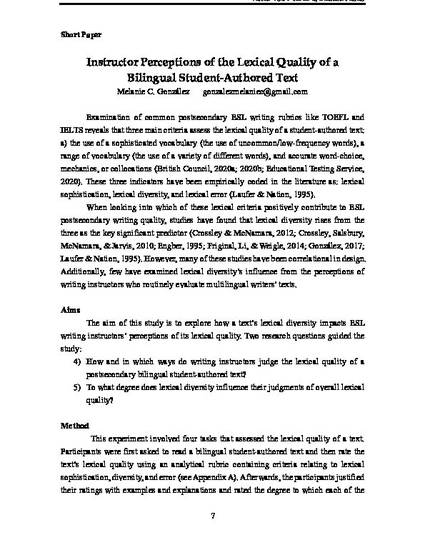
Article
Instructor Perceptions of the Lexical Quality of a Bilingual Student-Authored Text
Vocabulary Education & Research Bulletin
(2020)
Abstract
Examination of common postsecondary ESL writing rubrics like TOEFL and IELTS reveals that three main criteria assess the lexical quality of a student-authored text: a) the use of a sophisticated vocabulary (the use of uncommon/low-frequency words), a range of vocabulary (the use of a variety of different words), and accurate word-choice, mechanics, or collocations (British Council, 2020a; 2020b; Educational Testing Service, 2020). These three indicators have been empirically coded in the literature as: lexical sophistication, lexical diversity, and lexical error (Laufer & Nation, 1995).
When looking into which of these lexical criteria positively contribute to ESL postsecondary writing quality, studies have found that lexical diversity rises from the three as the key significant predictor (Crossley & McNamara, 2012; Crossley, Salsbury, McNamara, & Jarvis, 2010; Engber, 1995; Friginal, Li, & Weigle, 2014; González, 2017; Laufer & Nation, 1995). However, many of these studies have been correlational in design. Additionally, few have examined lexical diversity’s influence from the perceptions of writing instructors who routinely evaluate multilingual writers’ texts.
Publication Date
Summer 2020
Citation Information
Melanie C. González. "Instructor Perceptions of the Lexical Quality of a Bilingual Student-Authored Text" Vocabulary Education & Research Bulletin Vol. 9 Iss. 1 (2020) p. 7 - 15 Available at: http://works.bepress.com/melanie-gonzalez/24/
